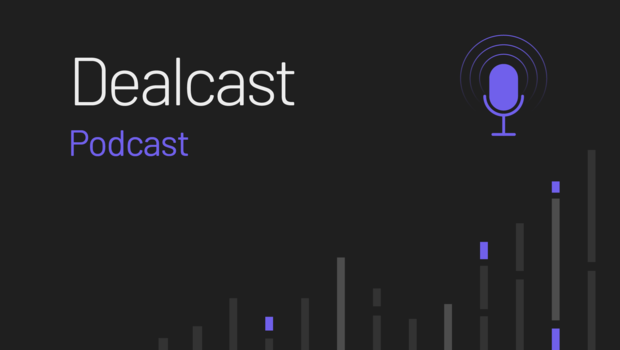The Impact of Russia's Invasion of Ukraine on ECM Activity in EMEA
19 April 2022
In this week’s episode, we’re discussing equity capital markets (ECM) activity in the EMEA region and how it has been impacted by Russia’s invasion of Ukraine. Joining host Julie-Anna Needham are ION Analytics’ Samuel Kerr, senior ECM editor, and Cristiano Dalla Bona, ECM reporter. Dealcast is presented by Mergermarket and SS&C Intralinks.
In this episode, you’ll learn about:
- How Russia’s invasion of Ukraine affected the IPO pipeline in EMEA
- Pockets of opportunities in Saudi Arabia and Dubai
- How Aramco’s IPO helped bring international investment to sectors beyond oil and gas
- When new listings could hit the volatile market
- Sectors that are faring better than others
- Long-term effects of the invasion on ECM
Dealmakers, sign up for our monthly INsights newsletter here.
[TRANSCRIPT]
[MUSIC PLAYING] JULIE-ANNA NEEDHAM: Welcome to Dealcast, the weekly M&A podcast presented to you by Mergermarket and SS&C Intralinks. I'm Julie-Anna Needham, a journalist who's been covering M&A for a decade. In this episode, we're finding out about ECM activity in the EMEA region and the impact of the war in Ukraine. I'm joined by Samuel Kerr, senior ECM editor, and Cristiano Dalla Bona, ECM reporter, both at ION Analytics.
Hi Samuel. Hi Cristiano. Thanks for joining me.
CRISTIANO DALLA BONA: Thank you.
SAMUEL KERR: Thanks for having us.
JULIE-ANNA NEEDHAM: So let's begin by rewinding a few months. How did the IPO Pipeline in the region look before the invasion of Ukraine took place on the 24th of February?
SAMUEL KERR: Well, actually, the IPO Pipeline looked pretty healthy before the invasion of Ukraine. We had some issues in the equity capital markets since the beginning of the year with the change in macroeconomic environment, central bank tightening, rapid inflation that we've obviously seen across the eurozone and also in the United States and of course, in the UK.
But some deals were ready, and some issuers were ready to try to test the IPO market and what we often call the pre-Easter window, so actually would have been around now that deals would have been pricing. And we had some very big names. We had the Swiss skincare company, Galderma, which is owned by EQT, the spin-off of Coke — well, demerger of Coca-Cola Beverages Africa, which was going to be listing in Johannesburg and Amsterdam, and a spin-off of ABB's mobility unit, and that would be done through an IPO as well. All very big names that were going to be coming to market and all obviously not coming to market now. Sorry, Cristiano, you wrote a few about Italy as well, didn't you?
CRISTIANO DALLA BONA: Yes, actually about an interesting one also that we're supposed to go was Plenitude, which is the renewable subsidiary of the energy giant Eni. They are supposed to be the curtain opener, and it's one of those that really made the pipeline early on.
JULIE-ANNA NEEDHAM: And can you talk me through how quickly issuers started to make decisions on delaying some of these deals after that invasion took place on the 24th of February?
SAMUEL KERR: Well, it's very interesting. I wrote an ECM pulse column on the day of the invasion. I was ringing the banks who were on all these deals who were frantically calling their clients to effectively tell them that the pre-Easter window was off.
From what we understand, some issuers pretty much got the message on the day or at least the day afterwards. A couple took maybe a week or so to come to the conclusion that it wasn't the right thing to try and do in IPO, whether it was a major European war going on. But actually, the decisions were made pretty quickly to delay those deals. And there's-- we've done a raft of coverage through the ECM pulse and also through stories on Mergermarket about specific company postponements. Cristiano has obviously been leading on that one.
CRISTIANO DALLA BONA: Yeah, one of the first few companies actually that we've seen postponing was Coca-Cola Africa. They were supposed to launch an IPO in the pre-Easter window. In the end, we were told that this was being postponed to at least May when the pricing should happen.
It's a big IPO. We're talking about USD 8 billion, and the company is trying to keep investors warm. But still, the time frame will be worked out probably in the coming weeks.
JULIE-ANNA NEEDHAM: Has there been a complete shutdown, would you say, in EMEA ECM activity? Or have there been pockets of opportunity? Maybe, Cristiano, you can start with that one.
CRISTIANO DALLA BONA: Yeah, there were pockets of opportunity. Especially, I would say surprisingly, in the SPAC, special purpose acquisition company space, we've seen one launch in Amsterdam from GP Bullhound, which is really focused on finding a target in the software space.
And then we've seen a couple in London. I would say the surprising one was one launched by Eni, which wants to find the company in the renewable space, which is also the reason why market sources thought they would launch such a product in this space. It's a hot sector, and it's one where targets can actually still be found. They managed to raise around 200 million pounds on the London Stock Exchange recently.
JULIE-ANNA NEEDHAM: And perhaps it's become an even hotter space given the move away from reliance on Russian fuel.
CRISTIANO DALLA BONA: Yeah, absolutely.
SAMUEL KERR: It's the Eni deal, particularly, was an interesting one because it was actually launched really during the teeth of the invasion. When everything else was falling by the wayside, Eni decided to go against the trend and to do a special-purpose acquisition vehicle, which I think is a sign actually that these kind of instruments are slightly easier asked than a normal fully marketed IPO.
Another area of opportunity that Cristiano has-- and I have been covering has been the Middle East actually, which has been an incredible sector-- sorry, hot region for the IPO market this year. I mean, particularly Saudi Arabia, there's been around three and 1/2 billion of IPO paper in Saudi Arabia in the first quarter, which is by far the best start to the year ever in the country.
And outside of Saudi, we've just had the IPO of DEWA, which is Dubai's state-owned utility business, which has been upsized now to a USD 6 billion IPO, which is a huge deal for Europe. I mean, I know that often people look at Middle Eastern deals and think of Saudi Aramco and USD 25 billion, but that's actually very rare. So a USD 6 billion deal is a massive thing for the whole EMEA market. And the fact that DEWA has been able to do that sort of side shows the incredible pockets of demand in the Middle East.
JULIE-ANNA NEEDHAM: And you mentioned Aramco there, which is certainly something I covered previously. But did that pave the way for ECM IPO activity in the Middle East and Saudi Arabia, specifically?
SAMUEL KERR: Of course, I still have nightmares about covering the Aramco IPO and the madness of that deal. But yeah, it actually did. I think Aramco really paved the way for people to start focusing on the Middle East. It wasn't actually a particular popular deal with international investors at the time.
The original plan for the Saudi government had always been to have a very large and widely distributed global book, which didn't happen because internationals didn't want to pay the price for Aramco. But since then, they've now been setting up local units to — so that they can trade in Saudi Arabia and also focusing more on the Middle East. But I think what's interesting, we've moved on now from Aramco.
And actually, what we're seeing in the Middle East now is not just oil and gas stocks coming to market, is a huge range of companies from across very fast-growing economies. Last year, the Saudi Tadawul did an IPO along with a food delivery company and ACWA power, which is this, a renewables division from Saudi. Obviously, in Dubai, we have a utilities company, and we have another company, Salik, which is going to be potentially listing this year, which is a road toll operator.
So you're seeing now the whole economy being represented in the IPO market. And we've moved now from a very oil and gas centric region to something where people can invest in lots of different companies.
JULIE-ANNA NEEDHAM: And moving away from the Middle East, looking at the wider EMEA market, when is it expected to reopen for new listings? I mean, we can't obviously anticipate what's going to happen in Ukraine. But what are your sources saying about when they expect it to reopen?
SAMUEL KERR: So we wrote an ECM pulse a couple of weeks ago saying that actually the market-- the window had been moved from post-Easter, which is often a traditional European IPO window with deals coming just after the Easter holidays to now, almost till summer. So June and July now look like they are target months for a lot of these issuers. I have a suspicion that a lot of this activity that was going to start to be moved back even to September in the autumn.
I think the volatility that's been caused by Ukraine has hit massive portfolio positions for lots of investors, and they're sitting on rather large losses. And I think what people also need to remember is that it wasn't a particularly great year even before Russia and Ukraine. We have those macroeconomic conditions that we spoke about before are still there.
It's horrible to say, but even though the Russia-Ukraine is horrible news to watch and the headlines are catastrophic, actually, for equity capital markets, the economic picture is the real story. And those conditions continue to worsen, as we see with the cost of living crisis and the indication that central banks are going to be raising interest rates rather quickly.
JULIE-ANNA NEEDHAM: And, Cristiano, do you have anything to add from-- on that? What are you hearing from your sources?
CRISTIANO DALLA BONA: Yeah, I mean, there still a sort of pipeline that people are putting their hopes in. For example, Sam mentioned Galderma and also the e-mobility unit of ABB. Both of these companies surprisingly said that they're sticking to their time frames. So they're looking at the second quarter as a potential window for their IPOs.
But also, again, Plenitude, that's an IPO in the making with a massive syndicate of banks working on it. But it's really working as a sort of image in any banker's head of a successful launch that might inspire all the other companies that are there waiting on the sidelines to say, OK. We can finally go and try.
JULIE-ANNA NEEDHAM: Yeah, so sentiment is obviously really important. And, Cristiano, with the sectors, we've mentioned the energy sector, but which other sectors are faring better than others?
CRISTIANO DALLA BONA: I would say that we're seeing some interesting sectors when it comes to the pipeline. For example, an unexpected one that I've been looking into was e-commerce. Again, there was a lot of fortune in that sector because of the pandemic, people being home and ordering any sort of items they wanted.
But now, there is a question that investors have around the future long-term and post-COVID of this sector. But we're seeing, for example, bull.com in Amsterdam. We are seeing an Irish company, eShopWorld, going for an IPO again in this space. So I would say this was an unexpected sector that is driving a lot of companies at the moment.
JULIE-ANNA NEEDHAM: And obviously, there are a huge amount of macroeconomic and geopolitical factors at play at the moment. The war in Ukraine has had a dramatic short-term effect on Europe's equity capital markets. Is there an expectation of longer-term one? Samuel, I know you've touched on some of this already with some of those macroeconomic factors, but what's the specific impact of the war in Ukraine?
SAMUEL KERR: I think a lot of it actually to a point that you raised earlier [INAUDIBLE] on energy, I think that's going to be something that we're going to be seeing funded now through the European equity capital markets and this push towards energy independence. Today, French — the French utility, EDF, has just wrapped up its rights issue. And we are now expecting to see far more European energy companies hit equity capital markets in order to raise capital in order to fund the infrastructure that's going to be required to wean Europe off Russian oil and gas. Most of that — well, so not most, a lot of that is going to be renewable energy.
We wrote a piece last week on hydrogen. And that's going to be a very important part of the European energy story, I think, going forward and actually is a very nascent part, so it does need a lot of investment. Obviously, all of the investment we've already made in wind farms and other renewable energy sources also needs to be doubled down on now because of the urgent need for energy independence from Russia. So I would expect to see that now being a consistent theme in the years ahead.
I think other long-term effects at the moment it's still early days, as you say. But I think we wrote a piece a few weeks ago talking to some bankers who say that they may never see a Russian IPO coming to market again in terms of their careers. Originally, that sounds quite dramatic.
But if you think about the severity of the war and the last time Russian companies were effectively exiled from capital markets after the annexation of Crimea in 2014, it took a good six to seven years for them to come back again. This is, by all means, worse, and it could be double or triple the length of time. And if you think about it that way, that probably will be most of the careers of some of the equity syndicates and equity capital markets bankers today.
JULIE-ANNA NEEDHAM: Yeah, and when I worked for Dealreporter and Mergermarket as a reporter, I covered a lot of the Russian mining companies listing in London. And it was a really interesting sector or subsector to cover because of all the challenges they had when they were listing and the kind of the-- well, some of the red flags that were raised which have become a lot more apparent now. Cristiano, to you, a final word on your expectation for the long-term effects on the equity capital markets.
CRISTIANO DALLA BONA: Absolutely. Sources mention a few blockbuster IPO is they are looming, maybe coming at the end of the year at this point that are still giving hope. For example, that there is Porsche in Germany that is currently in the process of appointing advisors. There is a big story on how they will handle the process and the shareholders behind it driving this process. And it's one of those that is really setting the agenda at the moment for the others to come.
But also, we are seeing potentially SoftBank's Arm looking to launch at the end of the year. And again, there was a big agenda discourse on this around the fact that they would go to New York rather than London and driving other companies to do the same. That has been one of the big topics we've seen in the past few months, this idea that London might be losing some IPO hopefuls to other exchanges.
JULIE-ANNA NEEDHAM: Yeah, and I guess for bankers and companies, there are so many risks to delaying. There are almost as many risks to delaying as there are to going ahead now with the inflation and rising interest rates.
SAMUEL KERR: Yeah, I think you're right. I mean, it must be an incredibly tough decision to do an IPO delay. I mean, I remember when I've spoken and interviewed issuers. They talk about years of preparation to get to that date.
And people have to remember when these pictures are one, the valuations that banks are talking to issuers about our entire [INAUDIBLE] for the 6, 7 months in advance of when the deal is actually launched. So we're talking about bull market conditions of 2021 when these companies originally gave their mandates out. So I think it's a very hard soul-searching exercise to have to delay an IPO.
But I would say it's far better choice to delay a deal rather than to go ahead and have to pull it in the middle of bookbuild or effectively price with a very bad book, which isn't convinced about the valuation that you're trying to sell your company at in the stock price created in the aftermarket. And obviously, we all know, and I'm sure you know as well, Juliana, from your time as a reporter, we have lists of failed IPOs and companies that have never recovered from some of earlier training. We can all talk about Aston Martin and Deliveroo, and I think that's a far worse long-term effect for a company than having to delay an IPO.
JULIE-ANNA NEEDHAM: Absolutely. Samuel and Cristiano, thanks very much.
CRISTIANO DALLA BONA: Thank you so much for having us.
SAMUEL KERR: Thank you.
JULIE-ANNA NEEDHAM: That was Samuel Kerr and Cristiano Dalla Bona. Thank you for listening to this week's episode of Dealcast presented by Mergermarket and SS&C Intralinks. Please rate, review, and follow the podcast.
You can find us on Apple Podcasts, Spotify, or look out for your Mergermarket news alert. For more information, check out our show notes. Join us next week for another episode.


